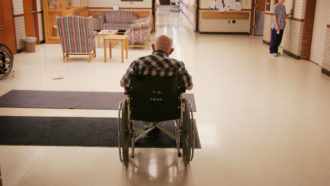A hotly disputed bill to ease restrictions on Cancer Treatment Centers of America’s facility in Newnan was defeated in a House committee vote Thursday.
The Health and Human Services Committee voted 13-8 against Senate Bill 31, which would have relaxed the state’s limits on bed capacity and the percentage of Georgia patients served by the CTCA hospital.
The committee’s brief discussion before the vote was much milder in tone than Wednesday’s emotionally charged hearing, which featured a testy exchange between the panel’s chair, Rep. Sharon Cooper (R-Marietta), and a Georgia Hospital Association official. (Here’s a link to the GHN story.)

Still, lawmakers expressed sharp differences of opinion about the legislation, which would ease restrictions, set in place a decade ago by the General Assembly, requiring that CTCA have no more than 50 beds and have no more than 35 percent Georgia residents among its patients.
“It comes down to choice in my mind, at a time when citizens are in the most vulnerable spot’’ when having a cancer diagnosis, said state Rep. Allen Peake (R-Macon), who voted for the bill.
Rep. Matt Hatchett (R-Dublin), referring to the 35 percent ceiling, added, “We are telling Georgia citizens they can’t get treatment at a facility in their state.”
But Rep. Don Parsons (R-Marietta), who said he has had cancer, pointed out that there are many hospitals in Georgia doing cancer care. “It’s been a good bit of oversell’’ by CTCA, he said. Hospital groups fought hard against the CTCA bid, saying that the company should stick to its original agreement on capacity and Georgia patients.
The bill was amended by Rep. Jodi Lott (R-Evans), who sought a compromise by proposing a five-year exemption for CTCA from the bed-size limit. That amendment was approved by the health panel, but when the amended bill came up for vote, opponents of the CTCA move prevailed.

The CTCA language may not be dead this session, however. The panel could take up the measure again, or the proposal could be attached to another bill in the last days of the General Assembly session.
“They say nothing is ever dead in the last days of the session,’’ said Cooper after the hearing. “It could come back up.”
“The end of the session is always crazy,’’ she added.
Cooper said she backed the bill because she is in favor of cancer patients and their families having the choice of treatment centers at “one of the most devastating times in a person’s life. They’re facing death.”
A CTCA lobbyist, Ray Williams, told GHN that “while we are certainly disappointed in the vote today, it is by no means over. We will continue to push this issue this session and fight for the rights of cancer patients throughout the state to ensure that they can have the access to the cancer care they want and deserve. ”

The House health panel approved a bill to create a new category in the state’s certificate of need (CON) laws to allow children’s hospitals in the state to have children’s beds “co-located’’ within a regular adult hospital. Both entities would jointly apply for the CON under the new category, said Children’s Healthcare of Atlanta, which supports the bill.
“This could help some hospitals in rural areas,” Cooper said.
Also Thursday, the state Senate passed a bill with several provisions to help rural hospitals.
House Bill 769 would ease the creation of ‘’micro-hospitals,’’ with 24/7 care and a small number of beds, to replace full-scale hospitals that close. It also would allow grants to help rural physicians afford medical malpractice insurance, as an incentive to practice in rural areas; permit remote pharmacy prescription orders from outside Georgia; and require training of rural hospital board and authority members.
The legislation, sponsored by state Rep. Rick Jasperse, a Jasper Republican, would also raise the rural tax credit for donations to rural hospitals from 90 percent to 100 percent. The bill was a product of the House Rural Development Council, which met several times last year to address rural issues.

In other health care action, the House passed legislation requiring comprehensive background checks and fingerprinting for owners, employees and job applicants at nursing homes, personal care homes, assisted living communities, private home care providers or adult day care.
Currently, licensed providers hiring employees are required to conduct only a name-based background check developed by the state of Georgia.
Under Senate Bill 406, the Georgia Department of Community Health would require all staff with direct access to residents to undergo an FBI fingerprint background check prior to employment. “The passage of SB 406 is a great victory for Georgia’s seniors.” Vicki Johnson, chair of the Georgia Council on Aging, said in a statement.
And a bill facilitating needle exchange programs cleared the Senate Health and Human Services Committee. House Bill 161 is sponsored by state Rep. Betty Price (R-Roswell), who has backed the measure in previous legislative sessions. Many experts say that given the realities of intravenous drug abuse, supplying clean needles to addicts lessens the spread of infections, saving lives and money.
Committee Chair Renee Unterman (R-Buford), though, added language to the needle exchange bill that would create a commission to address the crisis of addiction and substance abuse, and would establish a Georgia director of substance abuse, addiction and related disorders. The substance abuse language comes from Senate Bill 352, which Unterman sponsored but which failed to clear the House.

